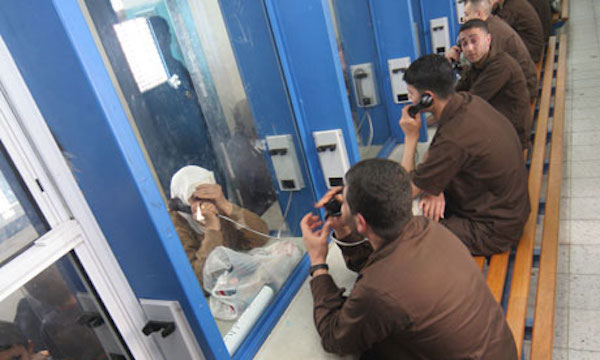You wake up very early, put on your best clothes and get ready for a long anticipated visit. Begins, with the early start of the journey, a recollection of events and a recalling of memories. For many, this will be their only opportunity to see loved ones held in Israeli prisons; others are denied those precious forty-five minute visits.

The journey to the forty-five minutes is similar to many other journeys Palestinians take to reach their workplace, schools and family members. It is a journey to screening- and double screening- rooms, to harassments and insults by young officers. The journey begins early in the morning, and in some cases it takes up to 15 hours until families finally return to their homes. For those fortunate enough to be allowed visits, this perhaps is the most valuable forty-five minutes of the month (and in many cases, the most valuable of one’s entire life).
Long humiliating hours pass before visitors reach the last stage of “inspection” separating them from loved ones. Anger at the humiliation faced is suddenly replaced (albeit, for a while) with a surge of emotions when a young Israeli prison “officer” opens the blue door separating visitors from the visiting room. Everyone rushes to the visiting room searching for loved ones standing behind double-bulletproof glass. The sight of seeing your loved one has the ability to fill your heart and mind with power, inspiration and love. There are a couple of “free” minutes: the clock has not yet started to countdown. Gestures of love and feelings fly, and a sigh of relief is heaved by those fortunate enough to make it to the visiting room.
Smiling behind the bulletproof glass are our loved ones. Their faces are full of happiness and joy. Silently, your loved one taps the bulletproof glass and you do so in return. Everyone seems to be doing the same thing. The glass (and the occupation) stands in the way of any possible physical touch between the prisoner and the visitor.
An unspoken agreement about the holiness of the upcoming forty-five minutes is present amongst everyone in the small visiting room. The clock, strategically placed behind the visitor and in front of the prisoner, begins to painfully count down the forty-five minute visit time.
Forty-five minutes.
The prisoner and the visitor pick up the phones fixed on both sides of the bulletproof glass. Attempts to recall memories and stories seem to fail the moment you hear your loved one’s voice. You remind yourself to stay strong and remain focused. You must remember everything you wanted to say; after all, you only have forty-five minutes.
Conversations begin.
Time is both blessed and cursed when you stand on the side of Israel’s high quality bulletproof glass. First-degree relatives of Palestinian political prisoners held in Israeli prisons have to go through several processes, and hurdles, to obtain permits allowing them to visit loved ones. In many cases, such as those of family members living in Gaza and those forbidden entry into Israel, having the most precious forty-five minutes is, in fact, impossible. As Addameer Prisoner Support and Human Rights Association notes, thousands of Palestinian prisoners serve their entire sentences without receiving regular family visits.
The prisoner and the visitor steal shy glances at the clock wishing that time could stop. But alas, it doesn’t. The clock continues to silently count down.
As stories flow, eyes carefully inspect changes appearing on loved ones. In prison visiting rooms, eyes can notice even the slightest details. They seem more focused. They have a greater ability to hold on to images. The conversation shifts to questions about health. The usual answer comes from the prisoners, “my health is great, don’t worry about me. How is yours?”
Topics of conversation keep changing. You talk about recent news, engagements, weddings, newborn family members, college grades, job opportunities, joy and anger. There is no silence during those precious forty-five minutes of love.
Each passing minute is full of love and hope. As the visit nears its end, families begin to talk quickly in the hope of not forgetting anything. They send words of love and longing in the remaining minutes of the visit. Families know that a minute or two, in which they can steal last glances at their loved ones, will remain following the “official” end of the visit.
The clock stops counting down. You can no longer hear your loved ones, neither can they. Goodbyes begin. You tap on the glass, wave your hand and stand in front of the glass refusing to leave. “Officers” begin to shout orders. You take one last long glance at your loved one and wave goodbye.
The Forty-five minutes of love are over. You have just lived one of the most precious forty-five minutes of your life.
A numb feeling similar to that of your first kiss follows. The love felt shortly carries you over the screening gates, the iron fences, the soldiers, and their guns. It caries you over Israel’s segregation wall, its systems of checkpoints, the Red Cross buses and ongoing state violence.
Palestinian political prisoners are a reminder of Israel’s racist policies and its ongoing attempts at erasing Palestinian memory and resistance. They are a face of the Palestinian peoples struggle for justice, equality and humanity.
To years of uninterrupted love and freedom.
Source: Mondoweiss.net




